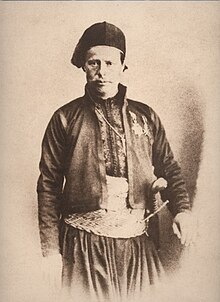Youssef Bey Karam
| Youssef Bey Karam يوسف بك كرم |
|
|---|---|
 |
|
| Personal details | |
| Born |
15 May 1823 Ehden, Lebanon |
| Died | 7 April 1889 Napoli, Italy |
| Nationality | |
| Religion | Maronite Catholic |
| Website | https://www.youssefbeykaram.org |
Youssef Bey Boutros Karam (also Joseph Bey Karam) (May 15, 1823 – April 7, 1889) (Arabic يوسف بك كرم), was a Lebanese Maronite notable who fought in the 1860 civil war and led a rebellion in 1866-1867 against the Ottoman Empire rule in Mount Lebanon. His proclamations have been interpreted as an early expression of Lebanese nationalism.
Youssef Karam was born to Sheikh Boutros Karam (Director of Ehden and surrounding district), and Mariam (daughter of Sheikh Antonios Abi Khattar Al Ayntouri) in Ehden, Lebanon. Raised in a family of six children: Catherine, Teresa, Rose, Eva, Mikhail and Youssef. His mother was strong, virtuous, possessed a strong personality; and had a strong influence on her son.
Youssef was a smart boy, with green eyes and fair complexion. He loved his hometown Ehden, with its majestic mountains and thick forests.He was French educated and at the age of 7, he was well versed in Arabic and French languages. He trained in unarmed combat, horse riding, shooting and fencing. His education in French helped him establish strong links with the west, especially France. Youssef has a special appreciation of Arabic, which was exemplified in many poetic writings.
His father has also decided to teach him the equestrian art. Sheikh Imad El Hachem from Aaqoura has taught him swordsmanship and shooting. According to his teachers, Karam was excellent at horsemanship, equestrian art and fighting with nude sticks of palm. He fought Youssef Agha Chantiri at Prince Bachir Square in Bekfaya, the prince Ali Mansour Abillamah and Hanna Bey Abi Saab at the Prince Square in Broumana, and snatched victory from the three.
In 1840, Youssef aged 17 years, fought alongside his father and elder brother against the Egyptian armies then occupying Lebanon in the battles of Houna and Bazoun. Youssef showed remarkable skill as a warrior and leader, and his reputation and influence in the area steadily grew; so much so that in 1846, when his father died, Youssef succeeded him as ruler instead of his elder brother. Youssef ruled with fairness, and his credibility and influence as a soldier and politician continued to grow.
Youssef Karam became the acknowledged leader of the district, and in time one of the most powerful personalities in Lebanese Politics. And although politically and militarily very powerful, he remained ever loyal to his faith and to the Church. Karam's loyalty to the Church and to Bkerke, the seat of the Maronite Patriarch, never wavered, and this loyalty was to have far reaching implications in future years.
...
Wikipedia
